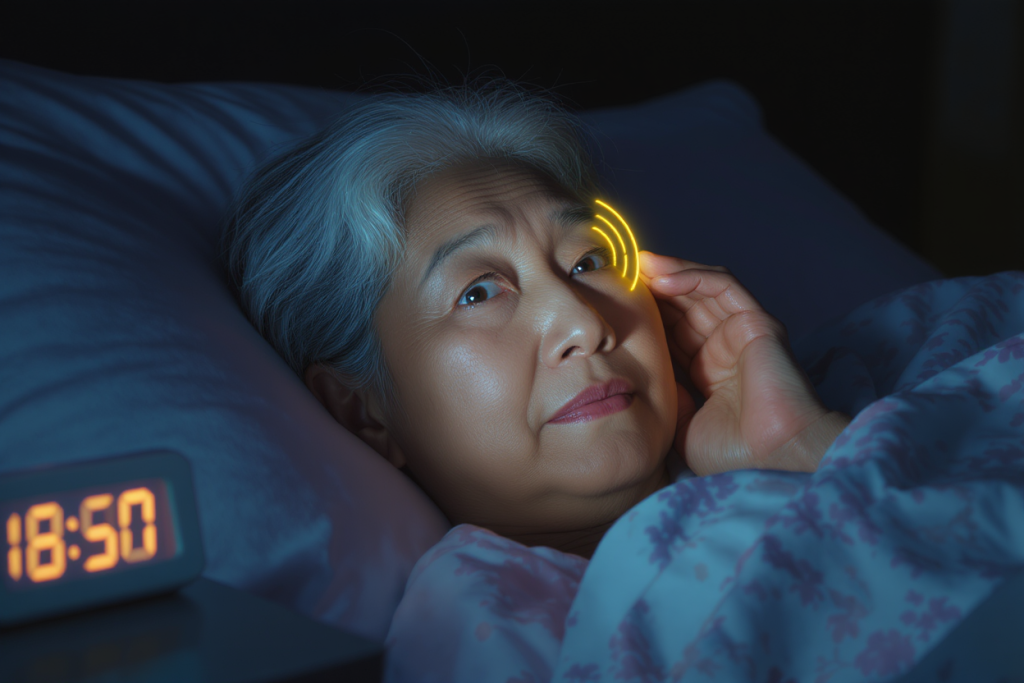No, tinnitus and hearing loss aren’t the same condition, though they often occur together. Tinnitus creates phantom sounds like ringing or buzzing that only you can hear, while hearing loss reduces your ability to detect actual environmental sounds. Both conditions can result from similar causes, such as loud noise exposure or aging, and may require different treatment approaches. Understanding their distinct characteristics will help you better manage these ear-related challenges.
Defining Tinnitus and Hearing Loss
Confusion often surrounds the relationship between tinnitus and hearing loss, but they’re distinct conditions with different characteristics. Tinnitus is the perception of sound when no external noise is present, typically experienced as ringing, buzzing, or whistling in your ears. It’s a symptom rather than a disease itself.

Hearing loss, on the other hand, involves a reduced ability to detect or understand sounds from your environment. While you might struggle to hear conversations, music, or everyday noises with hearing loss, tinnitus creates phantom sounds that only you can perceive. Though these conditions can occur separately, they often coexist because damage to the auditory system can trigger both issues. Understanding this difference is crucial for proper diagnosis and treatment of your symptoms.
Common Causes and Risk Factors
While both tinnitus and hearing loss can occur independently, they often share common triggers and risk factors. You’re more likely to experience either condition if you’ve been exposed to loud noises, especially from machinery, concerts, or firearms. Age-related changes, known as presbycusis, can lead to both conditions, typically affecting people over 60.
Medical conditions like high blood pressure, diabetes, and head injuries can trigger tinnitus and hearing loss. Certain medications, particularly some antibiotics and chemotherapy drugs, may damage your inner ear. You’re also at higher risk if you smoke, have a family history of hearing problems, or work in noisy environments. Ear infections, earwax blockages, and circulatory system disorders can contribute to both conditions as well.
The Connection Between Both Conditions
Although tinnitus and hearing loss are distinct conditions, they’re frequently interconnected. You might experience tinnitus as a symptom of hearing loss, as damage to your inner ear’s hair cells can trigger both issues simultaneously. When these cells are injured, they can send incorrect signals to your brain, resulting in phantom sounds while also reducing your ability to detect actual sounds.

However, you can have tinnitus without hearing loss, and vice versa. If you’re exposed to loud noises, you may develop both conditions, as noise-induced damage often affects both your hearing ability and triggers tinnitus. That’s why protecting your ears from excessive noise is crucial for preventing both conditions, and why you should seek professional help if you notice either symptom.
Diagnosis and Medical Evaluation
Getting proper medical attention for either tinnitus or hearing loss starts with an accurate diagnosis. Your doctor will first review your medical history and perform a physical examination of your ears. You’ll likely undergo several tests, including pure-tone audiometry to measure your hearing ability at different frequencies, and speech recognition tests to evaluate how well you understand spoken words.
For tinnitus specifically, you may need to describe the sound you’re hearing, its frequency, and when it occurs. Your healthcare provider might also recommend imaging tests like MRI or CT scans to rule out structural problems. If hearing loss is suspected, you’ll undergo comprehensive audiological testing to determine the type and severity of the loss, which helps guide treatment options.
Treatment Options and Management Strategies
Treatment approaches for tinnitus and hearing loss vary significantly based on their underlying causes. For hearing loss, you might benefit from hearing aids, cochlear implants, or corrective surgery. If you’re dealing with tinnitus, options include sound therapy, cognitive behavioral therapy, or tinnitus retraining therapy.
You can also manage both conditions through lifestyle modifications. For tinnitus, try avoiding triggers like caffeine, alcohol, and loud noises. Using white noise machines or smartphone apps can help mask the ringing sensation. If you have hearing loss, you’ll want to protect your remaining hearing by wearing protective gear in noisy environments and maintaining regular check-ups with your audiologist.
Remember that while there’s no cure for most types of tinnitus, many treatments can effectively reduce its impact on your daily life.
Prevention and Lifestyle Modifications
While neither tinnitus nor hearing loss can always be prevented, you can take several steps to protect your ears and reduce your risk. Start by limiting exposure to loud noises and using protective gear like earplugs or noise-canceling headphones when in noisy environments. Keep your music volume at 60% or lower, especially when using earbuds.
Maintain a healthy lifestyle by exercising regularly, managing stress, and getting adequate sleep. If you smoke, quit, as smoking can affect blood flow to your ears. Keep your blood pressure in check and follow a balanced diet rich in vitamins and minerals. Regular ear checkups can help detect potential issues early. If you work in a loud environment, take regular breaks and follow workplace safety guidelines for hearing protection.
